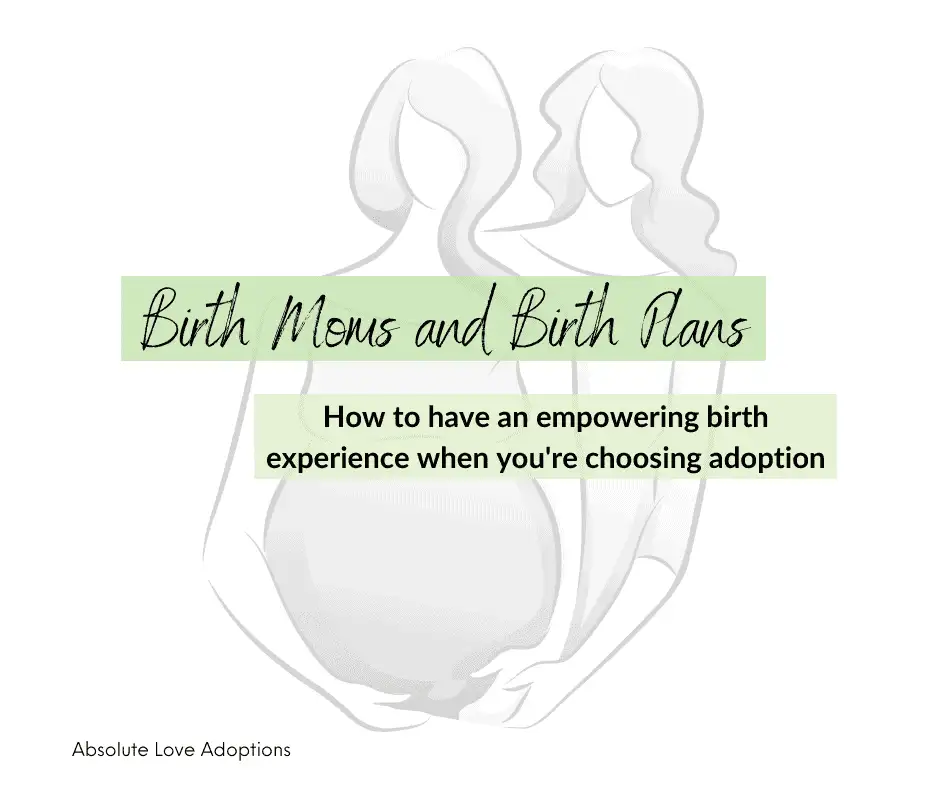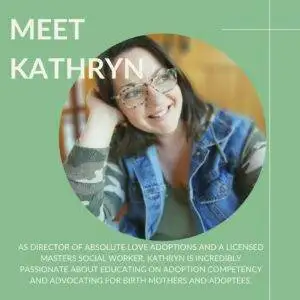
Birth Moms and Birth Plans: How to have an empowering birth experience when you’re choosing adoption
When you’re pregnant and approaching delivery, there is usually a lot of excitement and anticipation, but also equal parts of anxiety and dread. “Can’t this just be over” or “I don’t want to do this” are common thoughts about the birth process.
But it doesn’t have to be that way.
There is a certain amount of preparation and control you can have over the experience as the birthing person. This preparation becomes even more meaningful when you are planning for adoption for the child you are carrying. There are many decisions you should make for yourself and your baby so that you may have the most empowering birth experience. It is also beneficial to the Provider and the care team to know your plan for adoption and your desires for all of the important moments throughout the hospital experience that will impact how you identify as a mother and a woman, whether you ultimately parent your child or not.

We asked our hopeful adoptive mom Kelly Jean to weigh in on how a birth mother might prepare as a birthing person, talking specifically to the parts of the birth experience that are impactful when the mother is placing the baby for adoption. Kelly Jean is a nurse midwife and has had several opportunities to deliver babies being placed for adoption. Her perspective is also made unique by her identity as an adopted person. Kelly Jean was adopted at birth and is in a closed adoption with her birth parents. Furthermore, Kelly Jean and her devoted husband Joel are parents to their 4 year old son, an infertility miracle, and are home study approved and waiting to adopt.
Kelly Jean writes, women tend to approach birth from one of two perspectives: something incredible that you prepare for with the enthusiasm you might have planning your wedding or as a ‘means to an end’ – something you endure and just want to get over with. In both perspectives, the ‘goal’ is often seen as the baby themselves.
Particularly when making an adoption plan, it can be easy for both the mother and her care team to focus on the latter perspective: something to get through and over with.
But how you feel during your labor and birth, how you are treated by those around you and how you are cared for all matter. They are important long term for a mother’s view of herself, her birth and perhaps most importantly, her choice for adoption.
All women should feel they have a say in their birth and that they were supported and respected throughout the process. Birth can be a positive experience no matter what the birthing woman’s parenting plans are.
How might a mother considering adoption experience childbirth differently than a mother who is parenting her child?
Birth can bring up all sorts of emotions and memories. Birth that brings with it a loss can be especially hard because the birth itself makes that loss even more tangible. There can be a desire to hurry things up and “get it over with” but there can also be a hesitation in labor – knowing that giving birth is the start of letting go. This can cause labor to slow down at times. Know that this can be normal and labor will pick back up. If labor brings up unexpected feelings, it can help to talk with your support person or labor nurse. That gives them the best opportunity to help you.
For some women, their baby doesn’t fully become ‘real’ until birth. Prior to that the baby is felt more as a part of themselves than as a separate person. Delivery cements the reality that there truly was a tiny person growing inside you.
What might professionals working with a potential birth mother want to consider during delivery to be sensitive to the fact that she has chosen another family to raise her child?
Expectant moms make an incredibly difficult decision out of a deep love and care for their child – knowing full-well that the decision to place her child will be painful for her. While she may be planning for the adoption of her child, until she signs her consents after birth, she is not a “Birth Mother”. In fact, many women make adoption plans and then at the time of birth choose to parent. Therefore, during delivery the plan for adoption should not be considered final. She has full rights and privileges to make decisions for herself and her child during labor and birth. She should be treated with as much respect as any mother you care for.
It’s important for birth professionals to recognize that mothers choosing adoption for their child may have additional needs during labor/delivery and postpartum. Many mothers choose to make a birth plan prior to delivery to help guide their caregivers in their desires, but if she hasn’t, it’s important to ask what her wishes are – especially in regards to the baby.
This is where having a birth plan can be helpful. A birth plan gives you the opportunity to think through what you might want during your birth and communicate that to your care team. A birth plan is just a tool and it’s perfectly fine to change your mind later.
Things expectant mothers planning adoption might want to consider and write into their birth plan:
- Who do you want with you during labor? What about the birth? (The nursing staff is a great resource to help you limit who is allowed to visit if needed.) Some mothers choose to include the adoptive mom or parents in the room for delivery.
- Do you want the baby on your chest right after delivery? Standard in many hospitals is for the OB or midwife to immediately place the newborn on the birthing mother’s chest and then invite her support person to cut the cord. This can be a sweet moment of bonding for birth parents or may be a moment that birth parents choose to avoid.
- Who do you want to cut the umbilical cord? This can be your support person, your OB or midwife or even yourself! (If you have asked the adoptive parents to be present, one of them could cut the cord as well)
- Are you planning to breastfeed? Colostrum (first milk) is the perfect first food for baby because it’s so rich and filled with antibodies. Some mothers will nurse in those first few hours or days before they place their baby with the adoptive parents. Some with open adoptions choose to pump milk and ship it to the adoptive family, assuming all parties are comfortable with that. Others choose to use formula from the start. Click here to learn more about breastfeeding your child before placing them for adoption:
- Do you want the baby to room-in with you after delivery? Some hospitals will allow the intended parents to stay in a room in the hospital so that they can be nearby for you and the baby. If you choose to, they can provide the care to the baby while you recover. This is completely up to you. (You will have an Absolute Love Adoption Specialist there with you to navigate this).
Use this guide to help write your Birth Plan.
Other helpful tips:
If you need to talk to your nurse or OB/midwife in confidence for any reason (and can’t get alone any other way) – ask them to help you to the bathroom. That gives you a little privacy where you can ask them to limit your visitors, tell more private pieces of your story, anything that you might need that extra seclusion to share.
During admission, part of the intake questioning includes your post-delivery plans: do you have a car seat? Who will be the child’s pediatrician? For some women this questioning can be triggering, so be prepared to discuss your adoption plan upon arrival. (Your Absolute Love team will work with you to put this plan together and to communicate with the hospital social worker to avoid as many difficult moments as possible for you).
How might a Doula and/or the Midwifery model of care provide for the unique needs of birth mothers choosing adoption?
Women often choose midwives and doulas because they want the additional care and support they offer versus simply the safety and dependability of routine hospital care.
Midwives are trained healthcare providers that specialize in caring for low-risk women across the lifespan including well woman care, care during pregnancy, childbirth and postpartum, and care for the newborn in the first month of life. They generally have a master’s degree in nursing and are state licensed and board certified (the vast majority of midwives in the US are “Certified Nurse-Midwives” or CNMs, that is what I am as well). The term midwife literally means ‘with woman.’ Midwifery care is usually woman-centered and values education and shared decision-making with their patients. Most midwives deliver in hospitals and often work in the same practice as obstetricians while offering a more personalized type of care. They have more time to listen, answer questions, sit and just get to know their clients
A doula is distinguished from midwives in that their sole role is support of the birthing woman and her family/support system. They don’t provide any medical care (checking baby’s heart rate, checking your cervix, etc), but they do provide encouragement, reassurance about the normal parts of labor, hands-on comfort measures like massage, suggestions of additional comfort measures such as position changes or water therapy and help advocate for their clients when needed. They are someone who is always in your corner, making sure you are heard and understood. Another benefit of doulas is that each doula only attends one birth at a time – while your labor nurse and midwife or OB might have multiple laboring women they are caring for, your doula just has you and can be fully present throughout your entire labor. Doulas undergo many hours of training and birth observation prior to certification.
The benefits of doulas have been well established for birthing women: lower risk of cesarean section, shorter labors, less use of epidural anesthesia in labor. Visit this link for more evidence on Doula’s during delivery.
But the biggest benefit of doula support is the continuous emotional and physical support of the birthing mother. Where a woman might not have a birthing partner or supportive family, a doula can step in and offer that hands on, loving care. For women that already have a strong support system, a doula can help guide them in the best ways they can support the expectant mom in her labor and provide support to them as well. A great doula might be found pouring water onto a laboring mom’s back contraction after contraction, keeping her company while her partner grabs a quick bite to eat, or tirelessly pushing on her back throughout labor to bring some relief. Sometimes a doula might be just the person to bring some humor into the room or encourage a mother to make her desires known.
Both midwives and doulas are there to support women in their choices in childbirth and are accustomed to walking with women in a variety of approaches to birth. You don’t need to be planning an unmedicated birth to use a doula or midwife. You can use a doula and an epidural or choose a midwife and have a planned cesarean section.
In addition to the mental and emotional benefits of working with midwives and doulas, there are also significant physical benefits including lower chance of cesarean birth, lower chance of forceps/vacuum, lower rates of preterm delivery and less chance of severe perineal tears.
Women choosing to place their child for adoption may especially benefit from the personalized care of a nurse midwife or doula. The relationship that is built over the pregnancy establishes trust and puts the expectant mother at the center of all the decisions regarding her pregnancy, her child, and that child’s future. My hope is that after reading this, mothers can have a stronger voice in knowing that their choice is the right one and that their birth belongs to them.
In what ways does your identity as an adoptee, a mother by birth, a midwife by profession and now being a hopeful adoptive parent give you a perspective that may allow you to connect to a birth mother and her experience?
Prior to our fertility journey, I almost exclusively viewed adoption from my perspective as an adoptee – how adoption affected me and how it made me special or different. I viewed it as largely positive – I was chosen, wanted, and accepted.
When I became pregnant with our biological son, I felt a shift in my perspective – almost a realization that my adoption was about more than just me, more than just my adoptive parents. That it would have affected my birth parents as well. I’d always known this, but hadn’t fully considered their perspective.
I was placed in a closed adoption as an infant and grew up with limited information about my birth family. I started asking questions when we were struggling to get pregnant and through that I gained access to several documents that contained information about my birth parents’ medical history and lives in general. It was such a treasure to learn more about my background and see the similarities between myself and my birth parents. For now, just that knowledge has been enough for me.
When we started our adoption journey after multiple infertility treatments were unsuccessful, my focus on adoption shifted almost entirely to the perspective of birth mothers – I started looking for their voices in blogs, books, podcasts, etc. I realized how little I knew about this perspective. I began to care deeply that any expectant moms we encountered were treated well. I don’t think I fully appreciated the depth of the choice first parents make until I experienced pregnancy for myself.
Being a midwife gave me a unique appreciation for the ‘magic’ of pregnancy and birth. Having walked the difficult path we are now on, I’ve seen just how incredible the process is for all involved.
Incredibly difficult.
Incredibly loving.
Incredibly bold.
I hadn’t fully realized just how inspiring a birth story could be until now.
For more information about midwives and doulas, check out:
http://ourmomentoftruth.com/your-health/what-is-a-midwife/
https://www.dona.org/what-is-a-doula/
Check out the Doula’s we recommend in Erie, PA.
OTHER RESOURCES:
http://gracefilledmess.blogspot.com/2014/04/creating-adoption-hospital-plan-mini.html
https://adoption.com/5-reasons-birth-moms-should-consider-breastfeeding-before-placement




